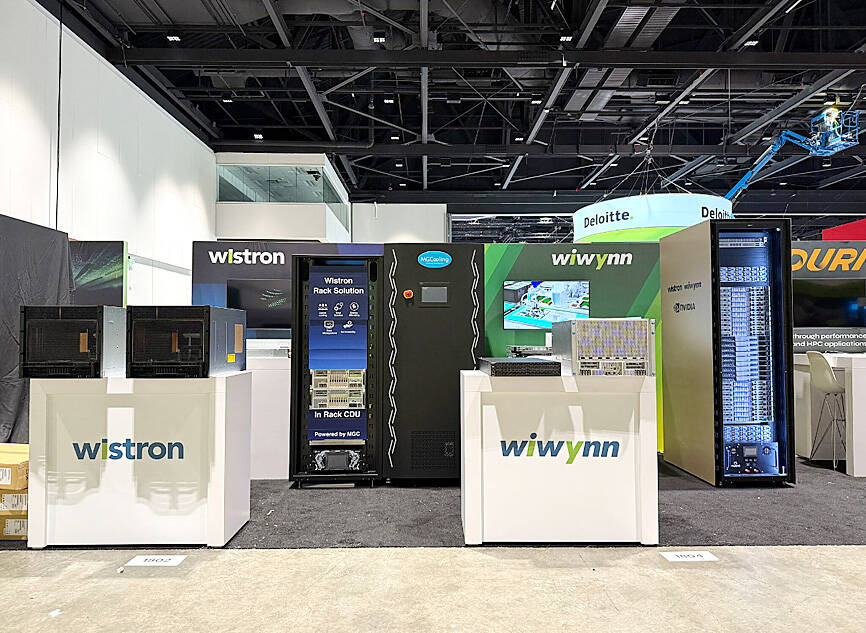Taiwan’s computer, server makers and suppliers of related components are to bear the brunt of the newly announced 32 percent tariff to be imposed by the US, as those hardware accounted for 58 percent of exports to the US in February, Ministry of Economic Affairs data showed.
The reciprocal levy of 32 percent is significantly higher than the 10 to 20 percent estimated by most research agencies. For now, Taiwanese semiconductor companies are exempted from the levy after Taiwan Semiconductor Manufacturing Co (台積電) unveiled an additional US$100 billion investment in the US last month.
Semiconductors were the third-biggest export item to the US in February, accounting for 4.6 percent at US$546 million, statistics compiled by the International Trade Administration showed.

Photo courtesy of Wiwynn Corp
The heavy tariff is to take a toll on local manufacturers of computers and servers, and other related companies, including graphic cards and solid-disk drives, as they were the biggest exporters to the US at US$6.84 billion, which were the biggest category of the total US$11.77 billion shipped to the US in February, the data showed.
Last year, local manufacturers shipped US$51.49 billion of such products to the US, more than doubling from a year earlier. Those goods accounted for 46.2 percent of Taiwan’s overall exports of US$111.36 billion to the US, statistics from the administration and the Ministry of Finance showed.
The US is the nation’s second-largest export destination, making up 23.4 percent of exports last year, the highest in 24 years.
The Ministry of Finance in a separate statement attributed the spike in US exports to strong server demand from cloud-service providers, which have hiked capital expenditures to cope with robust demand for artificial intelligence (AI) applications.
To avert adverse effects of the tariff, Wistron Corp (緯創) said on the eve of the tariff announcement that its board had approved a plan to set up a new US subsidiary, Wistron InfoComm (USA) Corp (WIUS), with initial capital of US$45 million.
WIUS plans to invest US$50 million in acquiring land and manufacturing facilities in the US, Wistron said in a statement on Wednesday.
The investment came after Wistron’s server manufacturing arm, Wiwynn Corp (緯穎), unveiled plans on March 1 to build its first US production line in Texas.
Wistron counts Nvidia Corp and other US enterprises among its major customers for general-purpose and AI-enabled servers.
The firm told investors in February that it has been exploring solutions to solve the tariff issue including converting its existing bases in Texas and California into manufacturing facilities.
At the time, some customers still requested the company ship AI servers to the US from its Mexico manufacturing sites and that they would absorb the 25 percent tariff on Mexico, given lower labor costs than the US.
Computer-related components were the second-biggest export items to the US, making up 5.5 percent of Taiwan’s exports in February at US$649 million.
Smartphones and related components, switches and routers came next with total US exports of US$525 million in February. Those suppliers would be subject to the 32 percent levy.

TAKING STOCK: A Taiwanese cookware firm in Vietnam urged customers to assess inventory or place orders early so shipments can reach the US while tariffs are paused Taiwanese businesses in Vietnam are exploring alternatives after the White House imposed a 46 percent import duty on Vietnamese goods, following US President Donald Trump’s announcement of “reciprocal” tariffs on the US’ trading partners. Lo Shih-liang (羅世良), chairman of Brico Industry Co (裕茂工業), a Taiwanese company that manufactures cast iron cookware and stove components in Vietnam, said that more than 40 percent of his business was tied to the US market, describing the constant US policy shifts as an emotional roller coaster. “I work during the day and stay up all night watching the news. I’ve been following US news until 3am

UNCERTAINTY: Innolux activated a stringent supply chain management mechanism, as it did during the COVID-19 pandemic, to ensure optimal inventory levels for customers Flat-panel display makers AUO Corp (友達) and Innolux Corp (群創) yesterday said that about 12 to 20 percent of their display business is at risk of potential US tariffs and that they would relocate production or shipment destinations to mitigate the levies’ effects. US tariffs would have a direct impact of US$200 million on AUO’s revenue, company chairman Paul Peng (彭雙浪) told reporters on the sidelines of the Touch Taiwan trade show in Taipei yesterday. That would make up about 12 percent of the company’s overall revenue. To cope with the tariff uncertainty, AUO plans to allocate its production to manufacturing facilities in

Six years ago, LVMH’s billionaire CEO Bernard Arnault and US President Donald Trump cut the blue ribbon on a factory in rural Texas that would make designer handbags for Louis Vuitton, one of the world’s best-known luxury brands. However, since the high-profile opening, the factory has faced a host of problems limiting production, 11 former Louis Vuitton employees said. The site has consistently ranked among the worst-performing for Louis Vuitton globally, “significantly” underperforming other facilities, said three former Louis Vuitton workers and a senior industry source, who cited internal rankings shared with staff. The plant’s problems — which have not

COLLABORATION: Given Taiwan’s key position in global supply chains, the US firm is discussing strategies with local partners and clients to deal with global uncertainties Advanced Micro Devices Inc (AMD) yesterday said it is meeting with local ecosystem partners, including Taiwan Semiconductor Manufacturing Co (TSMC, 台積電), to discuss strategies, including long-term manufacturing, to navigate uncertainties such as US tariffs, as Taiwan occupies an important position in global supply chains. AMD chief executive officer Lisa Su (蘇姿丰) told reporters that Taiwan is an important part of the chip designer’s ecosystem and she is discussing with partners and customers in Taiwan to forge strong collaborations on different areas during this critical period. AMD has just become the first artificial-intelligence (AI) server chip customer of TSMC to utilize its advanced